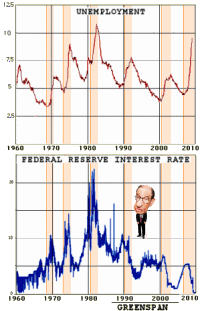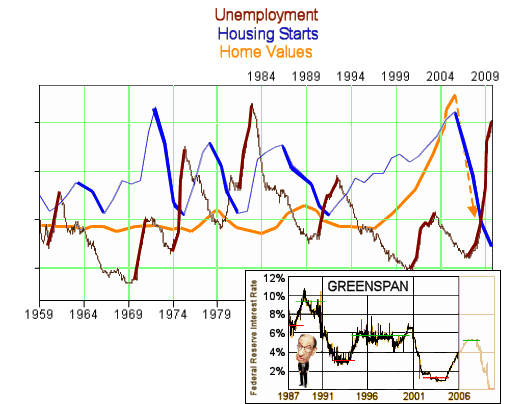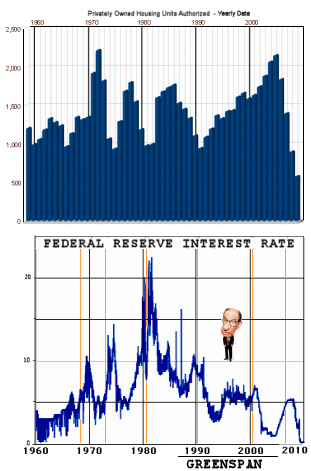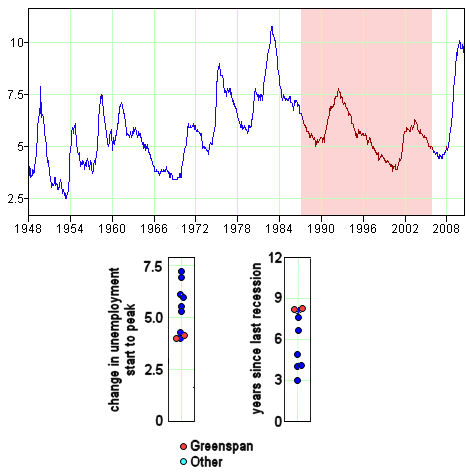With the stock market on a roller coaster, mortgages foreclosing, the housing market off and new questions being raised about the nation’s infrastructure, President Bush is striving to assure Americans that the economy is "strong"…
"The American economy is the envy of the world, and we need to keep it that way," Bush said, conceding that "I’m not an economist” but maintaining that he sees strong basic indicators in the state of the economy. "The fundamentals of our economy are strong… Job creation is strong. Real after-tax wages are on the rise. Inflation is low"…
“The fundamentals are strong, we’re just in a rough patch, as witnessed by the employment figures today.”
—President Bush, February 1, 2008
On the campaign trail in Jacksonville, Florida, the Senator [John McCain] declared this morning that "the fundamentals of our economy are strong," despite what he described as "tremendous turmoil in our financial markets and Wall Street"…
I grew up with a father who was from a family of immigrant coal miners who, himself, had grown up during the Dreat Depression. Like many of his generation, he carried those scars to the grave. It was the "pull yourselves up by the boot-straps" generation, particularly virulent around my house, so I avoided learning anything that he tried to teach me. I can still feel the shades trying to come down when people start talking "business" or "finance."
 There have only been a few times in my life when such things grabbed my attention – Reagan and Bush II. When Reagan began with the "trickle down" talk, I thought he was crazy and a front man for the business world. I still think that, only the feeling is even stronger. The second time was when George W. Bush cut taxes, then marched us off to war in two countries without any visible means of support for those wars. But then came the financial collapse of 2008 and that got my attention.
There have only been a few times in my life when such things grabbed my attention – Reagan and Bush II. When Reagan began with the "trickle down" talk, I thought he was crazy and a front man for the business world. I still think that, only the feeling is even stronger. The second time was when George W. Bush cut taxes, then marched us off to war in two countries without any visible means of support for those wars. But then came the financial collapse of 2008 and that got my attention.
About a year ago, I got interested in
Alan Greenspan and wrote a post [
greenspan’s folly…] looking into his tenure at the Fed. Like everyone else, I had always wondered how he kept us in the road for all of those years. I guess I had thought of him as a Wizard. He sounded like a Wizard. He definitely looked like a Wizard [actually, more like a Lizard]. And we certainly seemed to prosper under his Wizardry. On the right is a resurection of one of my graphs from that post showing the Interest Rate manipulations of the Fed. It wasn’t lost on me that he retired almost exactly on the day the "housing bubble" burst. Here’s what I concluded last year after I looked at the data:
When Greenspan took over in 1987, the Federal Reserve Rate was low for the time [first red mark] in response to the Recession during Reagan’s tenure. As the economy improved, Greenspan raised the Federal Reserve’s Rate [first green mark]. Towards the end of George H.W. Bush’s term, we had another recession. His first rate drop didn’t work, so he lowered it even further [second red mark], and then brought it back up as things improved [second green mark]. Note that he had to go lower that time, and never got the rate back up to its previous value. In 2001, the dotcom "bubble" burst and he had to lower rates dramatically [down to approximately 1%]. We didn’t really know it then, but there was a new malignant bubble forming – the "housing bubble." Certainly, Dr. Robert Shiller began to warn us about the "housing bubble." At first Greenspan denied it, but then felt the economy could "handle" the "housing bubble." In January 2006, he retired. Recall how his retirement was timed with the "housing bubble"…
Looking at the stairstep downward as Greenspan manipulated the Federal Reserve Interest Rates, it’s clear that each time, he has to go lower than the last. And he never gets it back up to its previous level. It was just a matter of time…
His replacement, Ben Bernanke, had nowhere to go – no reserve. He took interest rates to zero, but that just wasn’t enough. Looking at that graph, it’s completely clear that Greenspan was simply wrong. His method "worked," but each application got closer to the inevitable – a time when lowering the rate was a non-option.
So Alan Greenspan’s belief in the resiliency of the American Market was wrong. He was wrong in his active efforts to thwart Brooksley Born’s regulation of the Derivatives Market. Derivatives were little more than a Casino, exploited to build the credit default swaps that fueled the "housing bubble." And he was wrong that manipulating the Federal Interest Rate was a powerful enough tool to prevent a Recession/Depression. What’s worse, this graph shows that he should’ve known that this stairstep down was headed for disaster. And Brooksley Born made it very clear where the Derivative Market [unregulated] would take us.
It is sadly much like the subject of the last post. Ronald Reagan, George H.W. Bush, and George W. Bush used tax-cuts much as Greenspan used lowering the Federal Interest Rate. These methods brought short term success without much pain, but set things up for a big fall, the fall we’re in right now. Both methods also destroyed the buffer we had for something disastrous. So here we sit with Federal Reserve Interest Rates of zero and a staggering National Debt, and the only way to get us headed in the right direction is government spending, regulation, and involvement in the economy. And the Republican Party that brought us here is raising holy hell and obstructing progress, instead of saying "mea culpa" and helping out…
It’s not bad for a rookie, rereading it. Last year, I concluded that he was an Ayn Rand ideologue who was more driven by politics and the Wall Street constituency than sound economic analysis. His active opposition to the regulation of Derivatives seemed crazy to me. Brooksley Born was a true Prophet, and he banished her to the wilderness.
And as for that malarkey up there from Bush and McCain, it was typical of our last Administration – unfounded bullshit. Our "fundamentals" were in the toilet and had been for some time. Even their Wizard Greenspan had bailed out over a year before – and our fate was already sealed. Those comments, "the fundamentals of our economy are strong," rank up there with their predictions about Iraq – false reassurances! totally wrong!
But there are a couple of "why?" questions left on the table. Why did Alan Greenspan never really send the Interest Rates up high after a Recession? His predecessors stairstepped up, and he stairstepped down. That makes no sense to me. It didn’t a year ago. There’s another "why?" question from yesterday. Why are there bursts of building in the recovery from a Recession? The answer to that question is so obvious that I’m embarrassed that I didn’t know the answer immediately.
Why are there bursts of building in the recovery from a Recession?
It isn’t some mystical rhythm of the economy as I thought yesterday. It’s something much more mundane. All I had to do was glue two old graphs together. The way the Federal Reserve regulates our economy when there’s a Recession is to lower the Interest Rate. That gets money flowing again. It makes perfect sense. But when Interest Rates go down, Construction Loans are cheap and Mortgages are cheap, so building surges and people buy houses to take advantage of the low rates [so much for my economic mysticism].
Why did Alan Greenspan never really send the Interest Rates up high after a Recession?
Why did the building that started in the 90’s keep on even through a Recession?
Unfortunately, those two "why?" questions seem to reduce down to just one answer. Here’s some more graph gluing – My spaghetti graph from yesterday and a scaled timeline of Alan Greenspan’s manipulation of the Federal Reserve Interest Rates.

Looking at this has me rethinking the whole "housing bubble" thing. Heretofore, I’ve been attributing the "housing bubble" to the rise of the Derivative Trading and the commerce of bundling mortgages and selling them as commodities, insuring them with Credit Default Swaps. Alan Greenspan was certainly a part of that debacle in his active battle to keep Brooksley Born from regulating Derivatives [if you don’t know about her, it’s pretty key and I’ve summarized it here –
the economy of the entire planet…]. But he kept the Interest Rates low his whole tenure. So as the back story of trading in packaged Mortgages flowered of the Unregulated [invisible] Derivatives Market, the more traditional driver of building and buying in the housing market [low interest rates] continued – rates set mostly by none other that Wizard Alan Greenspan.
At the least, Greenspan abetted the "housing bubble" by keeping rates low, and he came close to being its major cause altogether. He was both the force that kept the Derivative Market off the Radar and the person who set the interest rates that fueled it. And he certainly didn’t do anything to stop it. "
Dr. Robert Shiller began to warn us about the "housing bubble [early on]. At first Greenspan denied it, but then felt the economy could ‘handle’ the ‘housing bubble’." I expect he was looking in the short term and basking in our prosperity. He took the short term route and left the long term consequences on the back burner. Well, that wasn’t a very good idea. In fact, it was a disastrous idea. Maybe the rest of America already knows this, but I didn’t…

Our fundamentals were anything but "sound" for a very long time before it became obvious how unsound they really were. Alan Greenspan, like the Wizard of Oz, looked strong out front, but was really a doddering old man behind the curtain it seems. I think I’m going to let this sit and try to digest my new Alan Greenspan thoughts for a bit. Was he an idealogue, a false prophet, a sinister manipulator, or just plain foolish? Whatever the answer, it wasn’t something deserving the Medal of Freedom…
UPDATE:
I did find one other consequence of Greenspan’s keeping Interest Rates so low. He did have the least frequent Recessions with the smallest increment of change in unemployment [start to peak] since World War II. He kept us out of Recession…
 There have only been a few times in my life when such things grabbed my attention – Reagan and Bush II. When Reagan began with the "trickle down" talk, I thought he was crazy and a front man for the business world. I still think that, only the feeling is even stronger. The second time was when George W. Bush cut taxes, then marched us off to war in two countries without any visible means of support for those wars. But then came the financial collapse of 2008 and that got my attention.
There have only been a few times in my life when such things grabbed my attention – Reagan and Bush II. When Reagan began with the "trickle down" talk, I thought he was crazy and a front man for the business world. I still think that, only the feeling is even stronger. The second time was when George W. Bush cut taxes, then marched us off to war in two countries without any visible means of support for those wars. But then came the financial collapse of 2008 and that got my attention.

 Our fundamentals were anything but "sound" for a very long time before it became obvious how unsound they really were. Alan Greenspan, like the Wizard of Oz, looked strong out front, but was really a doddering old man behind the curtain it seems. I think I’m going to let this sit and try to digest my new Alan Greenspan thoughts for a bit. Was he an idealogue, a false prophet, a sinister manipulator, or just plain foolish? Whatever the answer, it wasn’t something deserving the Medal of Freedom…
Our fundamentals were anything but "sound" for a very long time before it became obvious how unsound they really were. Alan Greenspan, like the Wizard of Oz, looked strong out front, but was really a doddering old man behind the curtain it seems. I think I’m going to let this sit and try to digest my new Alan Greenspan thoughts for a bit. Was he an idealogue, a false prophet, a sinister manipulator, or just plain foolish? Whatever the answer, it wasn’t something deserving the Medal of Freedom…
[…] fundamentals… […]
[…] fundamentals… […]